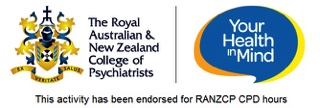Recovery-oriented Risk Management for Mental Health Practitioners
OUR CURIOUS MINDS
Recovery-orientated risk management is a breakthrough course tailored specifically to the trending challenges experienced by practitioners in embracing a recovery focused approach to mental health work. This includes facing difficult and complex risk scenarios and medico-legal challenges utilising 'Values Based Practice' principles.
Drawing upon the latest evidence base this course delivers practical and applied learnings to practitioners equipping them with improved knowledge, critical insights and a solid learning platform upon which to build their skills and confidence.
The course is broken down into an introductory session and then 5 carefully crafted and paced sessions providing participants with a unique and engaging online experience unlike any other in the field. This involves:
Learning objectives
On completion of the course, you will be able to:
-apply risk assessment research findings to practice
-understand the role of ‘risk factors’ and ‘protective factors' when working with risk
-appreciate the importance of balanced ‘positive risk taking’
- deal with ‘dilemmas’ that arise in risk-related challenges
With a 30 day money back guarantee, there is no risk to you or your organisation. Register now and find out why this course is being heralded as a breakthrough in negotiating challenging risk scenarios whilst maintaining a truly recovery focused approach.

"The important thing is not to stop questioning. Curiosity has its own reason for existing." Albert Einstein
Andrew Carroll & Brett Bridges
Fundamentals of Recovery
Screencast and Video: Fundamentals of Recovery
Handout
Bibliography
Further Reading
Fundamentals of recovery: MCQs
Fundamentals of Risk
Screencast and Video: Fundamentals of Risk Part A
Screencast and Video: Fundamentals of Risk Part B
Screencast and Video: Fundamentals of Risk Part C
Handout
Resource: Risk Factors and Protective Factors
Bibliography
Further Reading
Fundamentals of Risk: MCQs
Understanding Values
Screencast and Video : 'Understanding Values'
Handout
Bibliography
Further Reading
Understanding Values: MCQs
Integrating Risk Management and Recovery
Screencast and Video: Integrating Risk Management and Recovery
Handout
Bibliography
Further Reading
Integrating Risk Management and Recovery: MCQs
Dealing with Dilemmas
Screencast and Video: Dealing with Dilemmas
Handout
Bibliography
Risk Benefit Table - Desmond
Risk Benefit Table: Generic Template
Risk Benefit Table: Blank Template PDF
Dealing with Dilemmas: MCQs